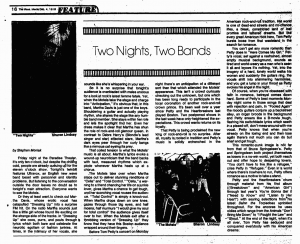Two Nights, Two Bands
By Stephen Moniak
The Mass Media -- December 4, 1979
Friday night at the Paradise Theater. It's only ten o'clock, but despite the chilling cold, people are already queuing up for the eleven o'clock show. Tonight's twinbill features Ultravox, an English new wave band beset with personnel and identity problems. But listening to the conversation outside the door leaves no doubt as to tonight's main attraction. Everyone wants to see the Motels.
Or they at least want to check out Martha Davis, whose erotic vocal has catapulted "Dressing Up" into a surprising FM hit. On the radio Martha sounds just like a little girl whose found life exciting on the stange side of the tracks. In "Dressing Up" she coos, purrs, and pouts through lyrics which both bare and celebrate the neurotic egotism of fashion junkies. At times, in the intimacy of her vocals, she sounds like she's whispering in your ear.
So it is no surprise that tonight's audience is overloaded with males anxious for a look at rock's latest femme fatale. Yet, when the Motels take the stage and charge into "Anticipation," it's obvious that, in this band, Martha Davis is just one of the boys. Shouldering a guitar and actually playing rhythm, she shares the stage like any humble band member. She stays within her role and lets the spotlight find her. Even her dress makes it clear that Martha has shun the role of rock-and-roll glamour queen. In contrast to Debra Harry's (Blondie's lead singer and star) effected state, Martha's dark eyes peer through her curly bangs like a nervous cat eyeing its prey.
The coiled tension is what the Motels' music is all about. Martha's lyrics evoke a wound-up neuroticism that the band backs with taut, measured rhythms with explode whenever Martha heats up a chorus.
The Motels take over when Martha steps out to deliver stunning renditions of "Celia" and "Total Control." "Celia," a warning to a friend chancing her life on a junkie lover, gives Martha a chance to get tough, and her scorching vocal rouses the audience. "Total Control" is simply a knock-out. When Martha drops down on one knee, gazes through those big eyes, and half moans, half murmurs "I would give my soul for total control" the audience gives itself over to her. When the Motels exit after a throbbing version of "Dressing Up" they know that they have this Boston audience wrapped around their fingers.
Before Tom Petty's concert on Monday night there's an anticipation of a different sort than that which attended the Motels' appearance. This isn't a crowd curiously checking out the unknown, but one which has long ready to participate in the local coronation of another rock-and-roll crown prince. It's been well over a year since Petty and the Heartbreakers last played Boston. Two postponed shows in the last week have only heightened the expectations. The crowd wants returns on its loyalty.
That Petty is being proclaimed the new king of rock-and-roll is no surprise. After all, royalty is rooted in tradition and Petty's music is solidly entrenched in the American rock-and-roll tradition. His world is one of dead-end streets and no-chance lifes, a bleak, constricted land of lost promise and tattered dreams. But like every great American rock hero, Tom Petty bursts loose from that wasteland in the search for romance.
You can't get any more romantic than Petty does in "Here Comes My Girl." Petty's vocal, set against a restrained, almost empty musical background, sounds as tired and world-weary as a man who's seen it all and knows it's nothing. Yet, into the imagery of a hard, lonely world walks his woman and suddenly the guitars ring, the vocals shift into shimmering harmonies, and you get a lump in your throat as Petty evokes his angel in the night.
Of course, when you're obsessed with faith in romance, betrayal comes down hard. Some of Petty's best moments Monday night come in those songs that deal with rejection and pain. In "Fooled Again" the moody guitars conjure up a backstreet alley, an organ broods in the background and Petty sneers like a B-movie tough, flashing his switchblade lyrics which seeth in a piss-off, don't-mess-around-with-me vocal. Petty knows that when you're already on the losing end and then lose again there's not much you can do but snarl and get tough.
This romantic-punk image is not far from that of Bruce Springsteen's. Petty and Springsteen both project themselves as losers in a no-win world, yet both reach out and offer hope to despairing lovers. "You don't have to live like a refugee," cries Petty in "Refugee." Even in a world where there's nowhere to run, Petty offers romance as a motive to take a stand.
Petty and the Heartbreakers churn out material from his first album ("Breakdown" and "American Girl") through last year's You're Gonna Get It ("Need to Know" and "Listen to Her Heart") with searing selections from his latest Damn the Torpedoes sprinkled throughout. For the encores he uses oldies which range from the Animals "Don't Bring Me Down" to "I Fought the Law" and "Shout." At the end of the night, when it's all over, Tom Petty has seduced and conquered everybody with his American dreams.

